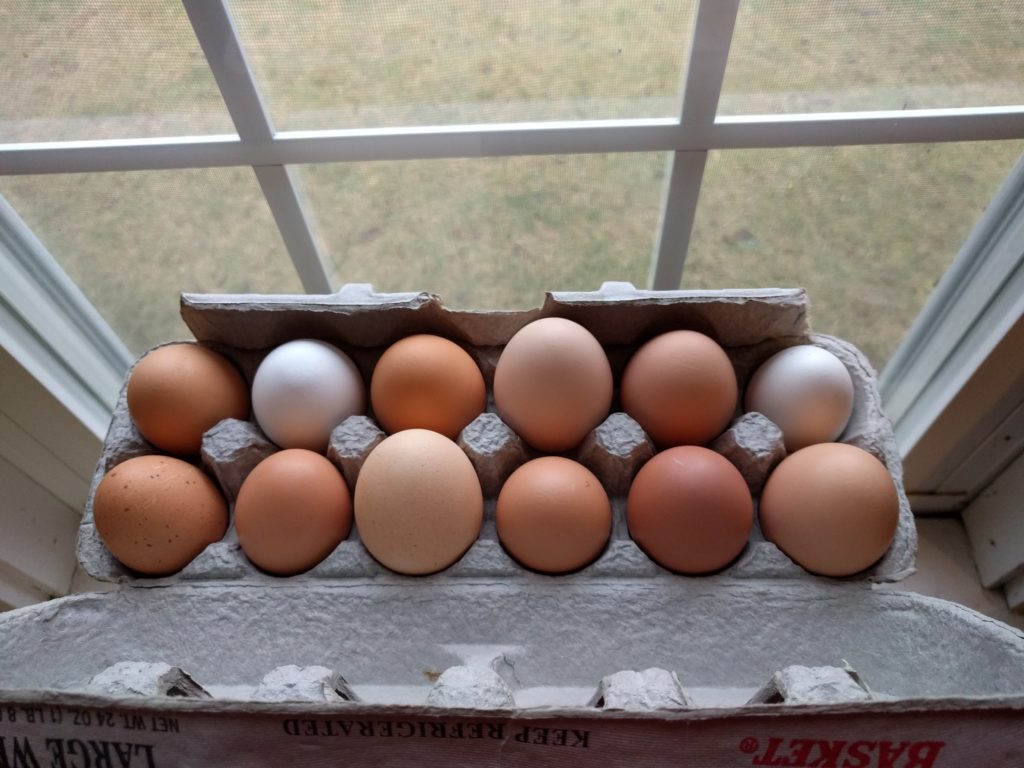Another in the series on How To Raise Chickens. After lots of hard work and planning, your chickens will provide an abundance of eggs.
In this article I’ll cover the how to collect, wash, eat and share the wonderful bounty.
Patience is a Virtue
If you’ve been following along in the How To Raise Chickens series, you have maybe noticed that it’s a lot of work to finally get an egg. But once they come, they come heavy.
Hens need several months to come into laying. But once they do, you may get up to one egg a day from each bird. Generally, it’s one egg every day or two.
Chickens will naturally want to lay eggs in the nesting box. The aspects that draw them in are the enclosure, darkness and bedding. I use hay for bedding in my nesting boxes, but I’ve seen chips and astro-turf work too.
 Collecting Eggs
Collecting Eggs
I don’t want to over-think this, but there are a few things that are worth noting.
- Frequency – Collect the eggs daily. I collect mine every evening when I close them in. Consider a mid-day collection in cold weather (so the eggs don’t freeze) and if any hens are going cannibalistic on your eggs.
- Occupied Nest – If a hen is sitting on the eggs at collection time dig deep for some courage to reach right under her. Most hens don’t care, some may try a little peck at you, but you’ll be fine.
- Basket – It’s nice to have a little basket to put the eggs in during collection. I put a little hay in the bottom to minimize breaking eggs. Most feed supply stores will sell an appropriately sized basket, but keep an eye in the antique shops to add some class to the hobby.
To WASH or not to WASH
Spend any time on the internet, or even in the books, around this question and you’ll find lots of differing opinions. Here’s the bottom line:
It Doesn’t Matter.
Yup.
Just do what works for you.
I’ll clarify my stance:
Eggs come out of a chicken with bloom on them. This bloom allows them to stay viable in the open for upwards of a week. In nature, this allows a bird to lay several eggs before going broody so she can hatch more than one egg at a time.
Sometimes, eggs also come out of the chicken with some traces of all the other stuff that comes out of chickens.
Washing the eggs removes any fecal matter, but it also removes the bloom.
With the bloom removed bacteria can transit through the porous shell, as can moisture an oxygen. So here’s the takeaway:
If you wash your eggs, refrigerate them. If you don’t wash, you may leave them out for a few days.
And no matter what you do, it’s not a big deal. At the scale that you’re working and the associated cleanliness, your risk factors are negligible compared to that nasty image that comes to mind when you think of factory farmed chickens and eggs.
Here’s what I do:
After collecting my eggs in the evening, I wash them in the kitchen sink under warm water, shake them off one time, and place them in a paperboard egg carton. That egg carton goes right in the refrigerator.
If I’m selling, or giving away, the eggs away I’ll give each egg a nudge because, as they dry, they can sometimes stick to the carton.
 An Egg of Questionable Age
An Egg of Questionable Age
Sweet tip coming up, because if you’ve ever smelled a rotten egg you’ll understand why it’s referenced by young boys.
Fresh eggs right out of Henny Penny will sink and lay on the bottom of a cup of water.
As they age, some moisture inside evaporates through the shell and is replaced with air, so they’ll begin to stand up on the bottom and eventually float.
If you find an egg and question how viable it is try floating it before cracking it.
How to Eat All Those Eggs!
This dilemma is answered very thoroughly in books and online, but I’ll touch on a few things that I do.
- Breakfast – I eat a 3 egg scramble EVERY MORNING. I love it so much I want to do a post on it.
- Boiled Eggs – Some go into an Egg Salad that Mamma makes, and the rest go on a green salad.
- Quiche – An easy way to move 10-12 eggs from the refrigerator and turn it into a family breakfast or dinner.
- Dog – Broken eggs, nasty eggs, and an occasional surplus egg go to the pup.
Those are the mainstays in our house and it ends up moving A LOT of eggs into our bellies.
Selling Eggs
If you cruise the back (and main) roads of New Hampshire you’ll find as many eggs signs as there are road signs.
At first, I assumed it to be a saturated market.
But if you consistently have an extra few dozen, I recommend finding someone who will commit to buying every week.
Like an egg share.
Another reason to become a super-connector in your community – the network.
Related: Become a Super-Connector in your Community
Daylight
The natural cycle for chickens is to lay fewer eggs as the days get shorter.
This gives you the option to accept the lower production, or provide supplemental lighting in the coop.
Supplemental lighting warrants a post on its own, so I’ll try to backfill this post when that happens.
But in the meantime, just be advised that the frequency will diminish in conjunction with the length of day.
All Good Things Must Come To An End
In closing, those wonderful hens do have a fixed number of eggs they can produce. After a couple years the frequency will diminish and eventually fizzle out.
I have not yet relegated any dried up hen to the stew pot, but it’s either that or feed them as a free loader.
Unfortunately, most of mine have died during my learning process of predators, which I’ll share with you in an upcoming post, so I don’t have many free loaders at this time.
I have processed many birds before, and that too warrants a post on it’s own.
As it turns out, there is a lot to know about raising chickens, but the stakes are low and the learning is fun and rewarding.
Be sure to check out the whole collection of articles on How To Raise Chickens.
Thanks for coming along for the ride and please subscribe to stay informed of all future articles, updates, and special offers.


